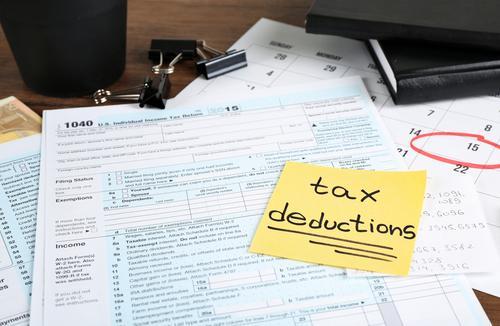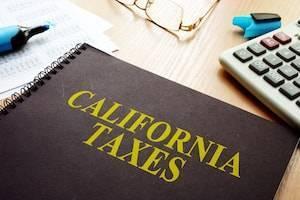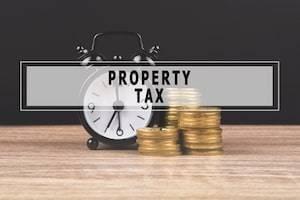Recent Blog Posts
How Have SALT Deductions Changed Under the Tax Cuts and Jobs Act?

The Tax Cuts and Jobs Act of 2017 (TCJA) implemented many changes that have affected taxpayers, including the deductions that are allowed on federal tax returns. Tax deductions can be used to lower the amount of a person’s income that is subject to taxes, and when used correctly, they can help minimize one’s tax obligations. One area that was affected by the TCJA is the deduction for state and local taxes, which is commonly known as the SALT deduction.
New Limits on SALT Deductions
The TCJA has put a new limit in place for the SALT deduction, and it applies to all homeowners. Previously, SALT deduction limits only applied to those filing as single with a gross income of more than $150,000 or $300,000 to those filing as married filing jointly. Now, the itemized deduction is limited to $10,000 for all taxpayers. According to the White House Office of Management and Budget, this new tax deduction limit will result in $57 billion more in taxes received by the federal government.
What You Need to Know About the Qualified Business Income Deduction

The qualified business income (QBI) deduction was created by Section 199A of the Tax Cuts and Jobs Act of 2017 and since then, the IRS has issued additional rules and guidelines on how taxpayers can take this deduction. Because it could significantly reduce a person’s tax burden, qualifying taxpayers should understand how this deduction operates and the limitations of the deduction.
Details of the QBI Deduction
A Section 199A QBI deduction can be taken by owners of pass-through entities engaged in qualified businesses. Such taxpayers can claim up to a 20 percent deduction on all qualified business income.
The regulations define a pass-through entity as partnerships or S-corporations that are directly or indirectly owned by one or more individuals, estates, or trusts. Some estates and trusts may also be considered pass-through entities that are eligible to take the deduction.
Stiffer Penalties May Be Coming for Non-Compliant FBAR Taxpayers

If you have foreign bank or financial accounts, you should be aware that there appears to be a change in the way penalties are calculated in instances of an unintentional breach of tax law. The change could mean significantly higher financial penalties for those who are not in compliance.
This change was signaled in an opinion rendered by the U.S. District Court for the Central District of California in the case of United States of America v. Jane Boyd. The court ruled that a breach of the filing obligations of the reports of foreign bank and financial accounts, or FBAR, could incur a penalty of up to $10,000 per foreign financial account.
Previously, under an interim guidance memorandum, after May 12, 2015, regardless of the number of accounts, the penalty for an unintentional breach was only $10,000 each year. This latest ruling means that U.S. taxpayers with more than one foreign financial account have a greater exposure, because they can incur cumulative penalties if they do not strictly comply with FBAR rules.
Paying the Correct Amount of Estimated Quarterly Taxes
 If you have to pay estimated quarterly taxes, it is critical to pay the correct amount. Underpaying can result in a penalty, and overpaying gives what is essentially an interest-free loan to the government that cannot be recouped until a return is filed.
If you have to pay estimated quarterly taxes, it is critical to pay the correct amount. Underpaying can result in a penalty, and overpaying gives what is essentially an interest-free loan to the government that cannot be recouped until a return is filed.
This is especially true in light of the Tax Cuts and Jobs Act of 2017, which substantially changed income taxes. The law altered the tax brackets and tax rates for individual or married taxpayers, made changes to the allowable deductions for business expenses, increased the standard deduction and child tax credit, took away personal exemptions, and limited or ended other deductions. Because of this, many taxpayers will need to adjust the amount of the taxes they remit each quarter via estimated tax payments.
Who Must Pay Estimated Quarterly Taxes?
Changes Made to California Use Tax Following Supreme Court Decision
 A recent U.S. Supreme Court case has prompted California legislators to change a state use tax law that affects out-of-state sellers. Under the new law, some retailers outside of California must register with the California Department of Tax and Fee Administration (CDTFA) and collect California use tax.
A recent U.S. Supreme Court case has prompted California legislators to change a state use tax law that affects out-of-state sellers. Under the new law, some retailers outside of California must register with the California Department of Tax and Fee Administration (CDTFA) and collect California use tax.
The law applies to remote sellers who have total sales of $500,000 in tangible personal property for delivery in California in the preceding or current calendar year. The law went into effect on April 1, 2019, so these sellers are required to collect and remit taxes on sales which occurred on or after this date.
Examples of out-of-state sellers that may be affected by this change include online merchants, mail-order catalogs, or telephone salespeople. Retailers with a physical presence in California will continue to have the same registration and use tax obligations as before the new law was passed.
IRS Expands Self-Correction Program for Retirement Accounts
 The administration of retirement accounts is notoriously technical, and mistakes by plan sponsors can occur. Furthermore, since an account holder will be maintaining and contributing to a retirement account for many years, there are often changes that must be made. Tax issues may arise when 403(b) and 401(a) retirement plans need to be corrected, and the IRS must typically be notified of any corrections. Fortunately, the IRS has several self-correction mechanisms in place that allow plan sponsors to resolve errors or mistakes on their own.
The administration of retirement accounts is notoriously technical, and mistakes by plan sponsors can occur. Furthermore, since an account holder will be maintaining and contributing to a retirement account for many years, there are often changes that must be made. Tax issues may arise when 403(b) and 401(a) retirement plans need to be corrected, and the IRS must typically be notified of any corrections. Fortunately, the IRS has several self-correction mechanisms in place that allow plan sponsors to resolve errors or mistakes on their own.
The IRS has three correction programs:
- Self-Correction Program (SCP): Used to amend certain plan failures without communicating with the IRS or paying a user fee.
- Voluntary Correction Program (VCP): Used to rectify failures not eligible for the SCP or get the IRS’s statement in writing that specified failures were correctly resolved.
What Taxes Will Apply to My Retirement Savings?
 Retirement should be a carefree time for those who have earned the chance to enjoy the later years of their life. When you no longer have to work, you are probably looking forward to spending time with family and pursuing hobbies, and you will be able to use the money you have saved throughout your career to provide for your needs. However, one thing that retirees are often surprised by is the fact that the funds coming out of their retirement accounts may be subject to taxes.
Retirement should be a carefree time for those who have earned the chance to enjoy the later years of their life. When you no longer have to work, you are probably looking forward to spending time with family and pursuing hobbies, and you will be able to use the money you have saved throughout your career to provide for your needs. However, one thing that retirees are often surprised by is the fact that the funds coming out of their retirement accounts may be subject to taxes.
Because retirees are on a fixed income, every dollar counts, and these taxes can cut into the amount of money you will be able to comfortably withdraw from your retirement savings. Fortunately, an experienced tax attorney can help you understand how you will be taxed during your retirement years.
Taxation on Retirement Income
Proposed Changes to Prop. 13 Could Cost California Businesses
 Property taxes are an issue that affects many taxpayers in California, and changes to these taxes may be coming in the near future. In the 2020 election, voters will be able to decide if Prop. 13 should continue to apply to businesses. The measure would increase property taxes that businesses have to pay the state of California.
Property taxes are an issue that affects many taxpayers in California, and changes to these taxes may be coming in the near future. In the 2020 election, voters will be able to decide if Prop. 13 should continue to apply to businesses. The measure would increase property taxes that businesses have to pay the state of California.
What is Prop. 13?
Prop. 13 is a ballot measure approved by California residents in 1978 that placed a limit on real property tax reassessment on all types of properties allowing reassessment only on completion of construction or when properties are sold. This means that currently, property owners pay taxes that are based on the value of a property when it was purchased, regardless of the property’s current market value. In effect, Prop. 13 prevented increases in property tax rates on homes, businesses, and farms by about 57 percent.
Will the IRS Pursue the Estate of a Deceased Person?
 There are several ways the IRS will be involved in the estate of someone who has died (known as a “decedent”). The IRS is notorious for enforcing payment of the taxes it claims it is due, including in situations involving a deceased person’s estate.
There are several ways the IRS will be involved in the estate of someone who has died (known as a “decedent”). The IRS is notorious for enforcing payment of the taxes it claims it is due, including in situations involving a deceased person’s estate.
Tax issues will be important to a deceased person’s personal representative, executor, successor trustee, and heirs, because the estate must pay all taxes due before the estate’s assets can be distributed to the beneficiaries. The IRS can even audit the tax returns of a dead person.
The estate will have to pay any income taxes due for the year of the person’s death (as well as for any year that the decedent did not file). Just like a taxpayer filing his or her income taxes each year, the estate administrator will file a Form 1040 for the estate. Depending on how organized the estate is, the estate administrator may need to file a Request for Transcript of Tax Return in order to get needed documents related to the deceased person’s income and taxes.
Business Tax Reporting Requirements for Large Cash Transactions
 As a business owner, the law requires that you take certain steps when you make large transactions. For cash transactions over $10,000, you must submit a form to the IRS reporting such a payment. Form 8300 is due 15 days after the transaction is completed. Entities who must file this form include individuals, companies, corporations, partnerships, associations, trusts, or estates.
As a business owner, the law requires that you take certain steps when you make large transactions. For cash transactions over $10,000, you must submit a form to the IRS reporting such a payment. Form 8300 is due 15 days after the transaction is completed. Entities who must file this form include individuals, companies, corporations, partnerships, associations, trusts, or estates.
How to File a Transaction Report
The IRS recommends that businesses electronically file cash transaction reports. Electronic filing has several benefits: it is fast and easy to do, and it costs the business nothing. Businesses also have the option to file Form 8300 on paper. To file electronically, a business needs to have an account with the Financial Crimes Enforcement Network’s BSA E-Filing System.









